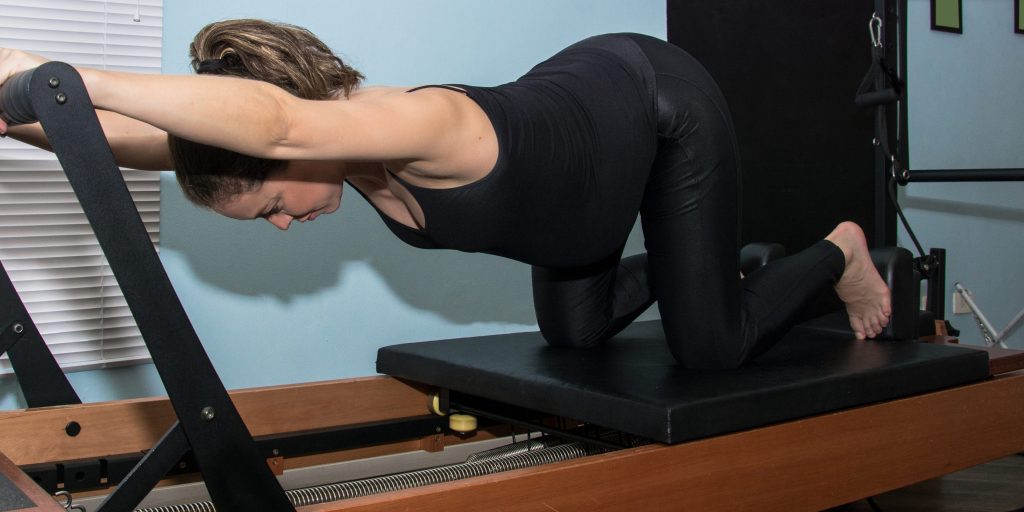
Research shows that there are so many benefits of doing exercise during your pregnancy. Whether you are in your first, second or third trimester will dictate the type and intensity of exercise you should participate in. Pilates is a great form of exercise for pregnant women to do, and you can continue with it right through the duration of your pregnancy.
Guidelines For Exercise During Pregnancy
The Australian Government Department of Health published guidelines on physical activity during pregnancy in 2021. These guidelines recommend that pregnant women aim to:
1. Be active on most if not all days of the week.
2. Do moderate intensity activities for 2.5-5 hours per week or vigorous intensity exercise for 1 ¼ – 2 ½ hours/week.
3. Do 30-60 mins of moderate intensity activity or do 15-30 mins of vigorous intensity activity most days.
4. Do muscle strengthening at least 2 days/week.
5. Break up long periods of sitting and standing.
6. Do pelvic floor exercises.
How Do I Know If I Am Pushing Myself Too Much?
Pilates is a gentle form of exercise and can be done safely without elevating your heart rate or body temperature into a range of concern. A simple way to measure exertion is using the “Talk Test”. If you can continue to carry out a conversation while exercising you are likely not overexerting yourself.
What Are The Benefits Of Exercise During Pregnancy?
Research has found that continuing to exercise throughout your pregnancy brings many physical and psychological benefits including;
1. Reduced incidence of cramping, oedema, and fatigue
2. A protective effect against the development of gestational diabetes and preeclampsia
3. Reduced postpartum depression
4. A lower incidence of preterm birth, caesarean birth, lower birth weight, and excessive gestational weight gain.
Are There Any Warning Signs To Discontinue Exercise While Pregnant?
Exercising within the recommended guidelines has been shown to be safe and beneficial for pregnant women. However, if you experience any of the below symptoms, you should stop exercise and check with your GP before returning to exercise:
1. Regular painful contractions
2. Dizziness
3. Headache
4. Chest pain
5. Calf pain or swelling
6. Vaginal bleeding
7. Abdominal pain
8. Amniotic fluid leakage
9. Dyspnea (i.e. difficult or laboured breathing) before exercise
Guidelines For Pilates During Pregnancy
While Pilates is a recommended way to exercise right through your pregnancy, there are some modifications that need to made to your program as you progress through each trimester. The relaxin hormone is released around week 12 which causes ligaments to become loose and joints to be more unstable. At this point, you need to be careful with stretching exercises that may increase the risk of injuries, and the focus moves to strengthening muscles surrounding the joints.
| 1st Trimester: Week 1-12 | 2nd Trimester: Week 13-26 | 3rd Trimester: Week 27+ | ||
| – Reduce rectus abdominus work – Reduce the intensity of the workouts – Can continue to do all Reformer and Mat Pilates exercises within comfort – Stay hydrated during exercise. | – No lying on your back after 20 weeks – No lying on your tummy once baby is showing – No abdominal work except targeting obliques in side-lying – No adduction-based exercises where you are squeezing your legs together against resistance – Caution with exercises that require you to separate your legs, or asymmetrical hip movements | – No lying on your back – No lying on your tummy – No abdominal work – No adduction-based exercises where you are squeezing your legs together against resistance – Caution with overhead movements that cause you to arch your back |
Pilates Exercise Examples
Below is a sample of the types of Pilates exercise that are good for you to do during each trimester of your pregnancy. However, please remember that everybody is different and each pregnancy is different, so you should see a qualified Pilates instructor to guide you and make sure the exercise is right for your situation.
First Trimester
It is recommended to exercise large muscle groups with a low load and higher number of repetitions.
Second Trimester
Focus on strengthening muscles at the back of your body. This helps counteract the increase in weight around your tummy and chest. You can do side-lying oblique strengthening.
Third Trimester
Focus on strengthening your arms and legs for the postpartum period. This is important to help you when nursing your baby and carrying baby equipment in/out of cars etc…
Pilates Physio At Central Performance
At Central Performance all of our Pilates instructors are registered physiotherapists with advanced training in clinical Pilates. This gives our clients the confidence of knowing that their program is safe and effective for them throughout all stages of their pregnancy. For more information please see our Pilates physio page or learn more more about our group Clinical Pilates classes.
We offer private (one-on-one) sessions, as well as small group classes with a maximum of 4 participants in each class. Keeping classes small means we can provide you with close supervision for perfect technique, as well as personalise your program so it is perfectly suited for you and your stage of pregnancy.
If you would like more information about how Pilates can help keep you active and strong during your pregnancy, please feel free to call us on 9280 2322 or click below to contact us or book online.
References
1. Berghella V, Saccone G. Exercise in pregnancy! Am J Obstet Gynecol 2017;216:335–7
2. ACOG. Physical Activity and Exercise During Pregnancy and the Postpartum Period. April 2020; 804.
3. Balogh A. Pilates and pregnancy. RCM Midwives : the Official Journal of the Royal College of Midwives. 2005 May;8(5):220-222. PMID: 15960329.
4. Lira do Nascimento S, Godoy A, Surita F, Silva J. Recommendations for physical exercise during pregnancy: a critical review of the literature. 2014 Sep; 36 (9): Brazil Gynecol obstetrics.

